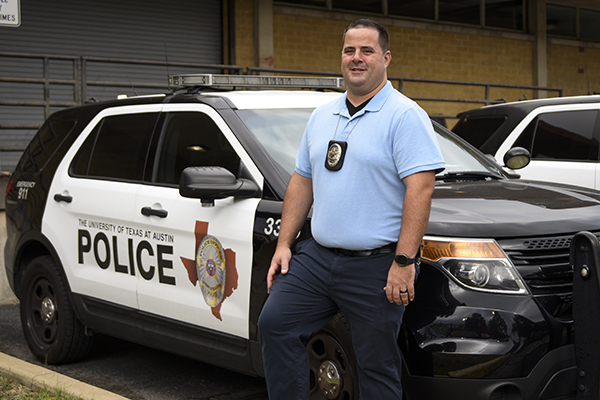The UT Police Department will participate in transgender awareness training to educate officers on proper LGBTQIA+ vocabulary, hate crime and gender marker laws and how to respect gender identities.
The training, which is being developed by UTPD LGBTQIA+ representative detective David Chambers and aims to begin next semester, is part of the Campus Pride Index requirements to make the University a LGBTQ-friendly institution. Campus Pride is a national nonprofit that provides tools to help colleges and universities become more inclusive to the LGBTQ community, according to the Campus Pride website. UT is currently rated four out of five stars in the index, according to the website.
Chambers said while the training will help fulfill index requirements, it is also important for officers to better interact with the campus community.
“I am a gay male … but when it comes to the transgender community, there’s still some questions and learning that I have to have,” Chambers said. “If someone has to call the police, it’s already a hard time for them. We don’t want our ignorance to make that worse for someone.”
Chambers said the two-hour-long training will consist of a PowerPoint presentation, handouts and four educational components — LGBTQIA+ terminology, LGBTQIA+ hate crime laws and University policies, gender markers on state IDs and driver’s licenses, and communication with transgender students who can talk about their experiences with discrimination and answer officers’ questions.
“It’s the basic information to prevent you from showing up in the media for doing something really wrong,” Chambers said. “It may not mean that we’re going to ask for pronouns at every single stop, but it may be instead of saying, Mr. Smith and Mrs. Smith, we may use the first name that the person introduces themselves as … instead of just making those assumptions about gender.”
Radio-television-film sophomore Map Pesqueira, a transgender man, said the training sounds like a step toward bridging the gap between law enforcement and the
LGBTQIA+ community.
“It’s going to be a really great way for the LGBT community and the law enforcement to be able to see eye to eye on these types of issues, and it’s an even better way to get around the curve of having police brutality against LGBTQ people, especially black and trans LGBTQ people,” Pesqueira said.
Pesqueira said police officers asking for pronouns and using a person’s chosen name will make a transgender or gender noncomforming person more comfortable in a
stressful interaction.
“A lot of times when police interact with trans and (gender-nonconforming) people, it could escalate very quickly because cops don’t want to call them by their chosen name or they don’t want to use the right pronouns, and that can just make the situation even worse,” Pesqueira said.
Chambers said he is part of the Queer and Trans Services Alliance, which is headed by the Gender and Sexuality Center and helps solve LGBTQIA+ issues across campus. The center’s staff said the alliance will provide definitions and vocabulary for the training.
“We think that more training for several offices on campus, as well as policy changes, can bring UT to the top of the index and ensure that queer and trans students are treated with respect and have the same opportunities to succeed as students who are not queer and trans,” the center’s staff said in an email.


















